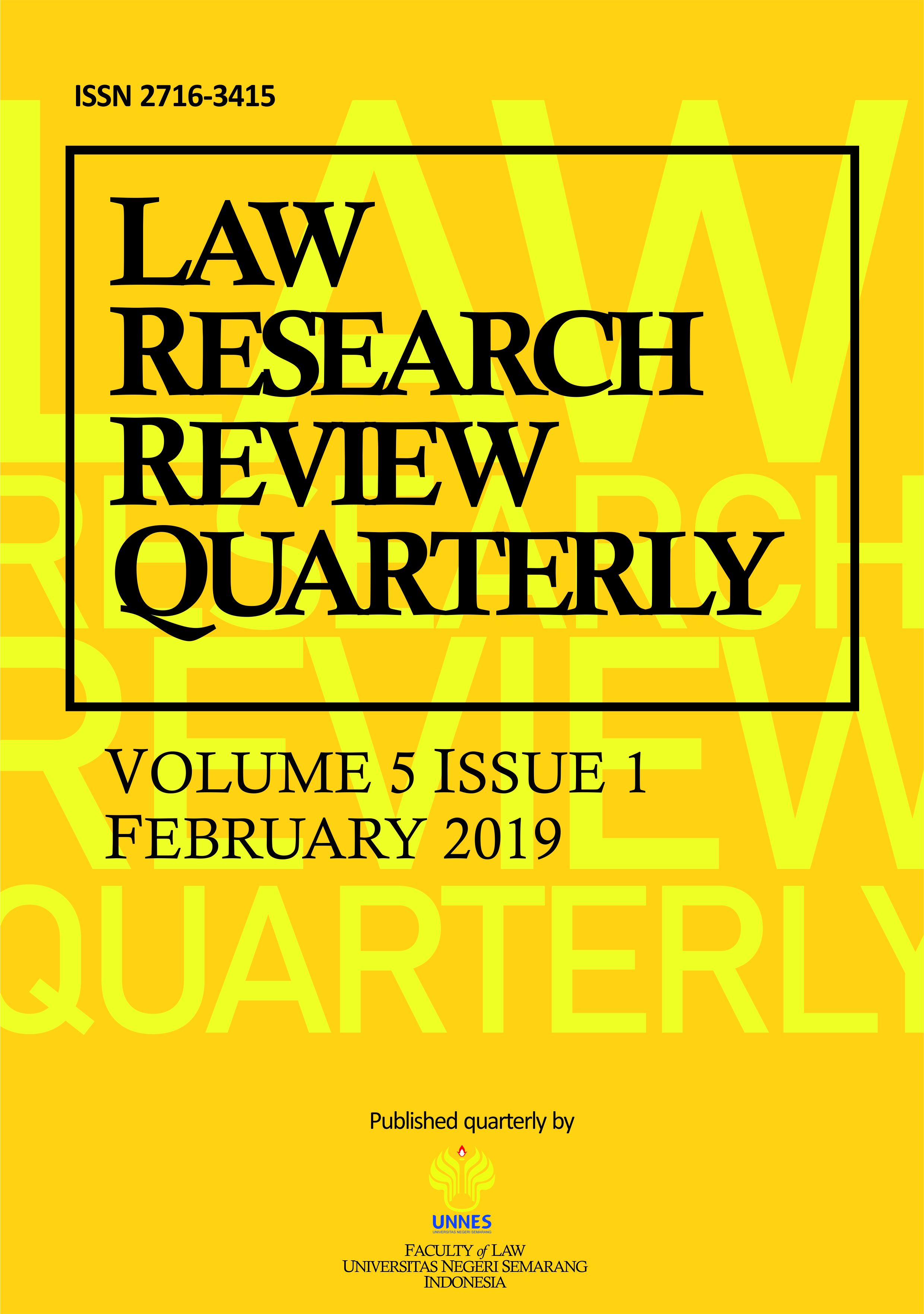Instilling Anti-Corruption Spirit Early on: An Sociological Juridical Review of Anti-Corruption Education that Grows among Students in the City of Semarang, Central Java
Main Article Content
Abstract
White Collar Crime or Corruption is no longer a foreign matter in the government of the State of Indonesia. Like a culture that is rooted and continues to evolve, the problem of corruption in Indonesia has not yet found a bright spot, all the resources and efforts continue to be deployed to eradicate the already chronic disease in the body of this country. In 2018, the International Transparency Organization launched data on the Corruption Perception Index (CPI). Based on these data, Indonesia was ranked 89th with a score of 38. The government is well aware that this problem is no longer an ordinary problem, but has become an entrenched culture even to the line of life of the Indonesian people, this certainly requires us to work harder to eradicate this disease to its roots. Based on this, the author argues that in an effort to solve the problem of corruption is not enough if we only rely on law enforcement officers. There is another aspect that the writer values ​​are very important in fighting this problem, that aspect is education. Eradication of corruption in the aspect of education can be applied as a preventive step, namely by instilling the value of honesty and justice in the souls of students. Based on this, the author took the initiative to conduct a research with a sociological juridical approach in the city of Semarang, Central Java.
Article Details
All writings published in this journal are personal views of the authors and do not represent the views of this journal and the author's affiliated institutions. Author(s) are retain the copyrights of the Article. However, before publishing, it is required to obtain written confirmation from Author(s) in order to ensure the originality (Author Statement of Originality). The statement is to be signed by at least one of the authors who have obtained the assent of the co-author(s) where applicable.This work licensed under a Creative Commons Attribution-ShareAlike 4.0 International (CC BY-SA 4.0)
References
Ahmad, Suhelmi. 2007. Pemikiran Politik Barat, Jakarta: Gramedia.
Chazawi, Adami. 2003. Kejahatan Terhadap Harta Benda. Malang: Bayumedia.
Mas, Marwan. 2014. Pemberantasan Tindak Pidana Korupsi. Jakarta: Ghalia Indonesia.
Syamsuddin, Aziz. 2011. Tindak Pidana Khusus. Jakarta: Sinar Grafika.
Jurnal
Djaja, Ermansjah. “Meredesain Pengadilan Tindak Pidana Korupsi implikasi Putusan Mahkamah Konstitusi Nomor 012-016-019/PPU-IV/2006â€. 2010. Jakarta: Sinar Grafika.
Ifrani, “Tindak Pidana Korupsi Sebagai Kejahatan Luar Biasaâ€, Jurnal Al’Adl, Vol. 9 No. 3. Desember 2017, Banjarmasin: Fakultas Hukum Universitas Lambung Mangkurat.
Pigome, Martha. “Reformasi Sistem Penegakan Hukum dalam Mengatasi Mafia Pertambangan Mineral dan Batu Baraâ€. Jurnal Media Hukum. Vol 18 No. 1. Juni 2011. Yogyakarta: Hukum UNY.
Purnomo, Langgeng. “Kesepakatan Sosial Sebagai Upaya Pencegahan dan Penanggulangan Tindak Pidana Pemilu (Studi Kasus Konflik Pemilu Tahun 2004 di Kabupaten Batang)â€. Jurnal Law Reform. Vol. 3 No. 1, Februari 2007, Semarang: Program Magister Ilmu Hukum Undip.
Ridwan. “Kebijakan Formulasi Hukum Pidana dalam Penanggulangan Tindak Pidana Korupsiâ€. Jurnal Ilmiah Jure Humano, Vol. 1 No. 1. Maret 2009. Serang: Fakultas Hukum Untirta.
Ridwan. “Telaah Kritis Tentang Penerapan Hukum Progresif dalam Penegakan Hukum Pidana di Indonesiaâ€, Jurnal Litigasi. Vol. 11 No. 2, Oktober 2010, Bandung: Fakultas Hukum Unpas.
Ridwan. “Upaya Memperbaharui Sistem Hukum Guna Membangun Integritas Penegak Hukumâ€. Jurnal Konstitusi PKK FH Unram. Vol. 11 No. 1. Juni 2011. Lombok: FH Unram.
Sugiarto, Totok. “Peranan Komisi Pemberantasan Korupsi (KPK) dalam Pemberantasan Tindak Pidana Korupsi di Indonesia. Jurnal Cakrawala Hukum. Vol. 18 No. 2. Juni 2013. Probolinggo: Fakultas Hukum Universitas Pancamarga Probolinggo.
Peraturan Perundang-Undangan
Moeljatno. Kitab Undang-Undang Hukum Pidana. 1983.
Undang-Undang Negara Republik Indonesia tahun 1945.
Undang-Undang Nomor 31 Tahun 1999 tentang Pemberantasan Tindak Pidana Korupsi.
Undang-Undang Nomor 20 Tahun 2001 tentang Perubahan atas Undang-Undang Nomor 31 Tahun 1999 tentang Pemberantasan Tindak Pidana Korupsi.
Undang-Undang Nomor 30 Tahun 2002 tentang Pemberantasan Tindak Pidana Korupsi.
Undang-Undang Nomor 20 tahun 2003 tentang Sistem Pendidikan Nasional.
Ketetapan Majelis Permusyawaratan Rakyat Republik Indonesia Nomor VIII/MPR/2001 tentang Rekomendasi Arah Kebijakan Pemberantasan dan Pencegahan Korupsi, Kolusi dan Nepotisme.
Data Elektronik
Fadhil, Haris. Detik.com. 2018. “KPK Tangani 178 Kasus Korupsi di 2018, Terbanyak Libatkan Legislatifâ€. https://news.detik.com/berita/d-4350420/kpk-tangani-178-kasus-korupsi-di-2018-terbanyak-libatkan-legislatif (Diakses 27 Maret 2019).
Rachman, Dylan Aprialdo. Kompas.com. 2018. “KPK dan 4 Kementrian Sepakati Implementasi Pendidikan Antikorupsiâ€. https://nasional.kompas.com/read/2018/12/11/15331641/kpk-dan-4-kementerian-sepakati-implementasi-pendidikan-antikorupsi. (Diakses 27 maret 2019).
Katadata.co.id. “Sejak 2004, 738 Pejabat Terjerat Tindak Pidana Korupsiâ€. 2018. https://databoks.katadata.co.id/datapublish/2018/06/05/sejak-2004-738-pejabat-terjerat-tindak-pidana-korupsi (Diakses 29 Maret 2019).
